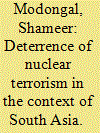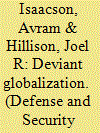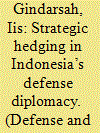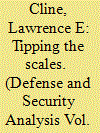|
|
|
Sort Order |
|
|
|
Items / Page
|
|
|
|
|
|
|
| Srl | Item |
| 1 |
ID:
148354


|
|
|
|
|
| Summary/Abstract |
Stability among the great powers during the Cold War is widely theorized in terms of nuclear deterrence. Rationality of states and their preference for survival are the basis of nuclear deterrence. The rationality of non-state terrorist groups is different from that of nation-states. Even though they are also rational actors with their own hierarchy of preferences, survival may not be their ultimate goal. Deterrence of nuclear terrorism is therefore different from deterrence against states. South Asia is more vulnerable to nuclear terrorism than any other region of the world for many reasons. This article analyzes the possibility of nuclear terrorism and the ways of deterrence against it in the context of South Asia.
|
|
|
|
|
|
|
|
|
|
|
|
|
|
|
|
| 2 |
ID:
148349


|
|
|
|
|
| Summary/Abstract |
In both Afghanistan and Iraq, US landpower was able to gain control rapidly over terrain. However, that control ebbed as US presence weakened. Non-state actors, such as the Taliban, the Haqqani network, the Islamic State, and Al Qaeda, gained control of segments of the population. Transnational Criminal Organizations capitalized on this permissive environment to strengthen their networks, often eroding the legitimacy of the host nation government, fueling regional instability, and, ultimately, undermining US policy objectives. The proliferation of deviant globalization, or the connectedness of subversive elements, is a key indicator of future conflict. Strategic landpower is uniquely positioned to influence the physical, psychological, economic, and social interactions of various non-state actors and their association with deviant globalization. It is no longer enough to seize and hold terrain. Landpower must also have the capability to influence the actions and attitudes of populations on that terrain wherever and whenever these interactions occur.
|
|
|
|
|
|
|
|
|
|
|
|
|
|
|
|
| 3 |
ID:
148352


|
|
|
|
|
| Summary/Abstract |
Hungary, a former communist state, adapted a Western-style defense planning system during the 1990s and 2000s. Although on the surface the elements of this planning system were similar to the planning programming budgeting system (PPBS) developed by the US Department of Defense, strategic guidance for defense planning has not been properly developed until recently. Thus, albeit PPBS-based defense plans were developed in the Hungarian Ministry of Defense (Hungarian MoD) regularly, they lacked both an expression of clear priorities and strategic focus. This article delineates the evolution of strategic guidance in the Hungarian MoD concentrating on current developments, and introduces the newly elaborated analytical concepts and tools, which helped to create needed strategic guidance in Hungary.
|
|
|
|
|
|
|
|
|
|
|
|
|
|
|
|
| 4 |
ID:
148353


|
|
|
|
|
| Summary/Abstract |
With the rapid pace of regional arms modernization and unresolved territorial disputes, Indonesia is increasingly susceptible to the impact of emerging great power rivalry in Asia-Pacific. Rather than pursuing a robust military build-up, Indonesian policy-makers assert that diplomacy is the country’s first line of defense. This article argues that defense diplomacy serves two agenda of Indonesia’s hedging strategy – strategic engagement and military modernization. This way, Indonesian defense and security officials seek to moderate the impact of geopolitical changes while maintaining the country’s defensive ability against regional uncertainties.
|
|
|
|
|
|
|
|
|
|
|
|
|
|
|
|
| 5 |
ID:
148350


|
|
|
|
|
| Summary/Abstract |
Particularly in African operations, United Nations (UN) peacekeeping forces have faced significant problems in restoring stability. In at least a few situations, unilateral national military interventions have been launched in the same countries. In the cases of Sierra Leone and Côte d’Ivoire, the British and French interventions respectively played a significant role in re-establishing stability. Lessons from these operations suggest that if effective coordination and liaison channels are established, such hybrid unilateral-UN missions can in fact be more successful than “pure” peace operations.
|
|
|
|
|
|
|
|
|
|
|
|
|
|
|
|
| 6 |
ID:
148351


|
|
|
|
|
| Summary/Abstract |
A comprehensive paradigm of future wars can be defined, and is called in this article “Extended conflicts.” These can be characterized by strategic attrition, to which all national resources and all possible international legitimacy are mobilized, in order to achieve a resolution by transformation of the opponent. The use of military force in this kind of conflict is limited. The understanding that we are facing an era of extended conflicts will improve the way it is utilized.
|
|
|
|
|
|
|
|
|
|
|
|
|
|
|
|
|
|
|
|
|